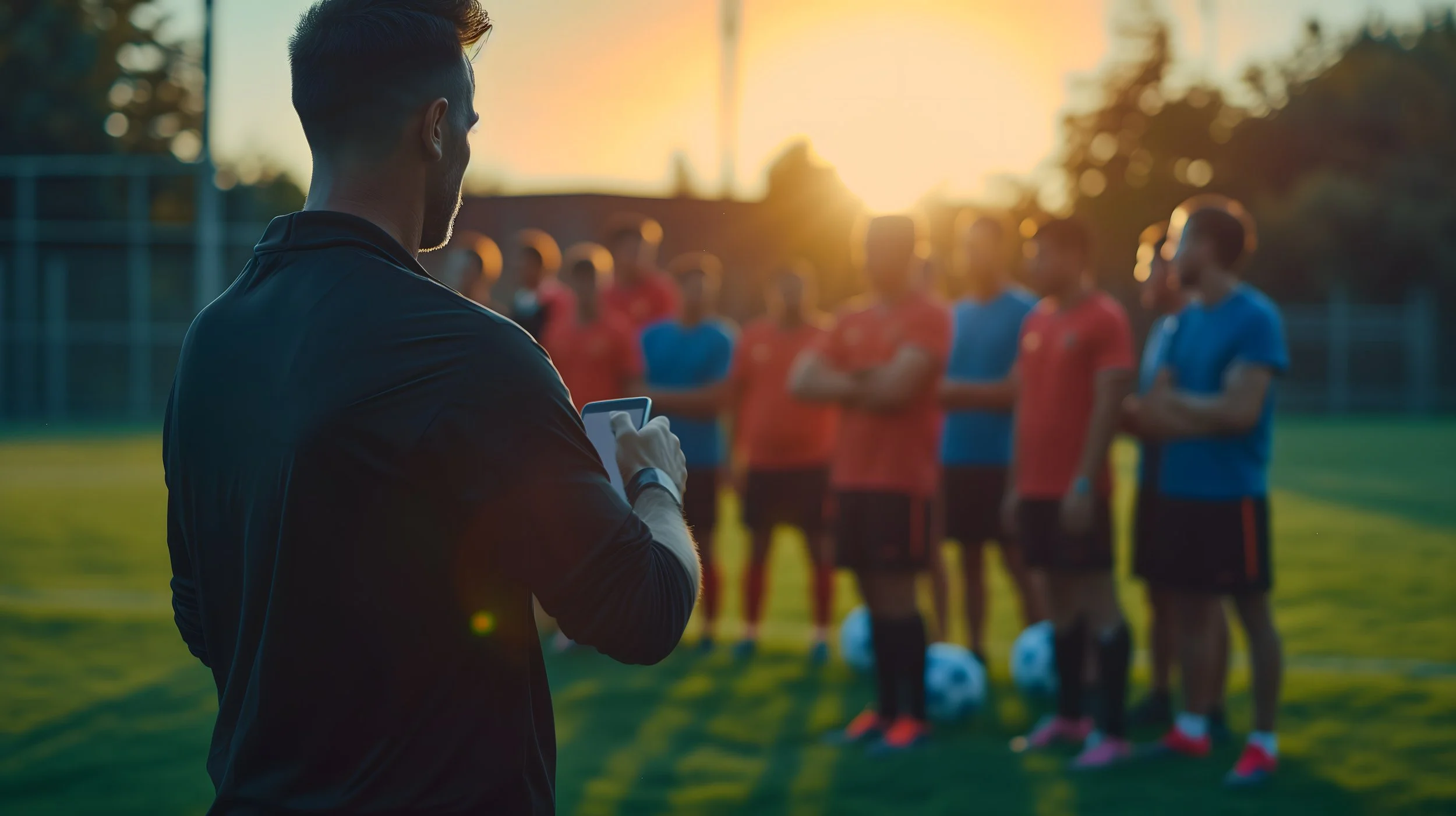Our Services
Talent Management
We refer to Talent management in the context of sports as the strategic and holistic approach of identifying, nurturing, developing, and maximizing the potential of athletic talents to enhance their performance, brand, and overall value. Effectively managing athletic talent involves a combination of personalized coaching, mentoring, career guidance, brand building, and support services tailored to the unique needs and goals of each athlete.
Here are some key strategies for how we will effectively managing athletic talent to improve their personal brand and value:
1 - Personalized Development Plans: Create individualized development plans for athletes that focus on their strengths, weaknesses, and long-term goals. This plan will include specific training programs, skill development, and performance enhancement strategies.
2 - Brand Building: Help athletes build and promote their personal brand by establishing a strong online presence, leveraging social media platforms, securing endorsement deals, and engaging with fans and sponsors. A positive and consistent brand image can increase an athlete's marketability and value.
3 - Career Transition Support: Provide resources and guidance to help athletes successfully transition into post-athletic careers. This may involve educational opportunities, vocational training, networking support, and financial planning to ensure a smooth transition and sustained success beyond their athletic careers.
4 - Health and Wellness Management: Prioritize the overall well-being of athletes by offering access to sports psychologists, nutritionists, physical therapists, and other wellness professionals to support their physical and mental health. A healthy athlete is more likely to perform well and maintain a positive image.
5 - Financial Planning and Management: Educate athletes on financial literacy, investment strategies, and wealth management to secure their financial future. Helping athletes understand the importance of financial planning can protect their earnings, reduce risks, and build long-term wealth.
6 - Networking and Relationship Building: Encourage athletes to build strong relationships with coaches, teammates, industry professionals, sponsors, and fans. Networking can open up opportunities for collaboration, sponsorships, endorsements, and career advancement.
By implementing these strategies and providing comprehensive support to athletes, Global Sports Fund Management Group can effectively manage athletic talent to enhance their personal brand and value both on and off the field.
Team acquisition - turning poor performing into elite
Acquiring sports assets or teams and transforming them from poor performers into elite entities requires a strategic and multifaceted approach. Here's a step-by-step guide on how Global Sports Fund Management Group can achieve this transformation and improve the overall value and sustainability of a team:
1 - Strategic Planning and Due Diligence:
Conduct thorough research and analysis to identify undervalued or underperforming sports assets or teams that have the potential for improvement.
Develop a strategic acquisition plan that aligns with the company's goals, budget, and long-term vision for transforming the team.
2 - Identifying Key Areas for Improvement:
Assess the current performance, structure, and operations of the team to pinpoint areas that need improvement, such as player roster, coaching staff, facilities, marketing, and fan engagement.
Determine key performance indicators (KPIs) to track progress and measure the success of the transformation process.
3 - Talent Recruitment and Development:
Recruit top talent, including skilled players, experienced coaches, and support staff who can contribute to the team's success.
Implement a comprehensive player development program to enhance skills, performance, and team cohesion.
4 - Strategic Partnerships and Sponsorships:
Forge partnerships with sponsors, brands, and other stakeholders to increase revenue streams, enhance visibility, and support team operations.
Leverage strategic partnerships to access resources, expertise, and networking opportunities that can benefit the team.
5 - Fan Engagement and Community Outreach:
Develop engaging fan experiences, marketing campaigns, and community outreach programs to increase fan loyalty, attendance, and revenue.
Create a strong brand identity and cultivate a dedicated fan base that supports the team through wins and losses.
6 - Facility Upgrades and Infrastructure Investment:
Invest in state-of-the-art facilities, training venues, and infrastructure to provide athletes with the resources they need to excel.
Enhance the fan experience through stadium improvements, amenities, and technology upgrades that attract and retain spectators.
7 - Data-Driven Performance Analysis:
Implement data analytics and performance tracking systems to evaluate player and team performance, identify trends, and make informed decisions.
Use data insights to optimize training programs, game strategies, and recruitment efforts for sustained success.
By strategically acquiring sports assets or teams and implementing a comprehensive plan to improve performance, engage stakeholders, and enhance overall value, a company can successfully transform a poor-performing team into an elite entity that is sustainable, competitive, and highly valued in the sports industry.
Securing event rights locally and globally
Securing and executing event rights, both locally and globally, involves a multi-faceted approach that requires strategic planning, negotiation skills, legal expertise, and operational excellence. Here's a comprehensive guide on how Global Sports Fund Management Group can secure and deliver event rights effectively:
1 - Market Research and Opportunity Identification:
Conduct market research to identify potential events or properties with valuable rights that align with the company's objectives and target audience.
Evaluate the financial viability, audience reach, and growth potential of different event rights opportunities to make informed decisions.
2 - Negotiation and Contracting:
Engage in negotiations with event organizers, governing bodies, or rights holders to secure the rights to host or broadcast events.
Draft clear and comprehensive contracts that outline the terms, exclusivity, duration, and financial arrangements of the rights agreement.
3 - Legal Compliance and Due Diligence:
Ensure legal compliance with intellectual property rights, licensing agreements, broadcasting regulations, and other legal requirements related to event rights.
Conduct thorough due diligence to verify the legitimacy of the rights, assess potential risks, and protect the company's interests.
4 - Strategic Partnerships and Sponsorships:
Develop strategic partnerships with sponsors, broadcasters, advertisers, and other stakeholders to enhance the value and visibility of the event rights.
Leverage sponsorships and collaborations to drive revenue, promote the events, and create engaging content for audiences.
5 - Operational Planning and Execution:
Develop a detailed operational plan that covers logistics, marketing, ticketing, staffing, technology integration, and broadcast strategies for delivering the event rights.
Ensure seamless execution of the event, including venue setup, security measures, audiovisual production, live streaming, and fan engagement activities.
6 - Audience Engagement and Marketing:
Implement targeted marketing campaigns, social media promotions, and PR initiatives to build anticipation, drive ticket sales, and engage fans before, during, and after the event.
Create memorable experiences for attendees, fans, and viewers through interactive content, behind-the-scenes access, and interactive features.
7 - Post-Event Analysis and Evaluation:
Conduct a thorough evaluation of the event's performance, audience feedback, revenue generation, and overall success metrics to inform future event rights acquisitions.
Identify areas of improvement, lessons learned, and best practices to enhance the company's event rights portfolio and deliver better experiences in the future.
By following these strategic steps and leveraging expertise in negotiation, legal compliance, operations, marketing, and audience engagement, Global Sports Fund Management Group can successfully secure, execute, and deliver event rights locally and globally, creating valuable and engaging experiences for audiences worldwide.
Education and pathway development and Government funded programs
Developing development and pathway programs, as well as securing government funding for sports initiatives, requires a combination of strategic planning, partnership building, proposal writing, and compliance with regulations. Here's a guide on how Global Sports Fund Management Group can develop these programs and access government funding:
1 - Needs Assessment and Program Design:
Conduct a needs assessment to identify gaps, challenges, and opportunities in athlete development and pathway programs.
Design comprehensive programs that address the specific needs of athletes at different skill levels, from grassroots to elite levels.
2 - Partnership Building and Stakeholder Engagement:
Collaborate with sports organizations, educational institutions, community groups, and government agencies to build partnerships and support for development programs.
Engage with key stakeholders to gather input, secure resources, and leverage expertise in program development and implementation.
3 - Grant Research and Proposal Writing:
Research government grant programs, funding opportunities, and sponsorship initiatives that support sports development, talent identification, and pathway programs.
Write compelling grant proposals that clearly articulate program objectives, target outcomes, budget requirements, and evaluation methods to secure funding.
4 - Compliance and Reporting:
Ensure compliance with government regulations, funding guidelines, reporting requirements, and performance metrics specified in grant agreements.
Develop monitoring and evaluation frameworks to track program impact, measure outcomes, and report results to funding agencies and stakeholders.
5 - Program Implementation and Evaluation:
Implement development and pathway programs according to established timelines, budgets, and performance indicators outlined in program plans.
Evaluate program effectiveness, participant satisfaction, and impact on athlete development using qualitative and quantitative data analysis methods.
6 - Capacity Building and Training:
Provide training, mentorship, and resources to coaches, trainers, and program staff to enhance their skills in talent identification, athlete development, and program delivery.
Build organizational capacity to sustain and scale development programs over time, leveraging knowledge sharing, best practices, and continuous improvement strategies.
7 - Sustainability and Long-Term Planning:
Develop long-term sustainability plans for development programs that integrate funding diversification, revenue generation strategies, and strategic partnerships.
Plan for program expansion, replication, and innovation to ensure continued growth and impact on athlete development pathways.
By following these steps and combining expertise in program design, partnership building, grant writing, compliance, and evaluation, Global Sports Fund Management Group can successfully develop development and pathway programs while accessing government funding support for sustainable sports initiatives that benefit athletes at all levels of skill and experience
Consultation and execution of funding and delivery of Stadia, Elite training centres and commercial building development
Consultation and execution of funding for developing stadiums, elite training centres, and commercial buildings require a strategic approach that involves financial planning, project management, stakeholder engagement, and compliance with regulations. Here's a guide on how Global Sports Fund Management Group can effectively undertake these initiatives:
1 - Needs Assessment and Feasibility Study:
Conduct a comprehensive needs assessment to identify the requirements and objectives of developing stadiums, elite training centres, and commercial buildings.
Conduct feasibility studies to assess the financial, economic, and operational viability of the projects.
2 - Financial Planning and Funding Strategies:
Develop a detailed financial plan that includes cost estimates, funding sources, revenue projections, and return on investment analysis for each development project.
Explore a mix of funding options, including grants, loans, sponsorships, partnerships, government incentives, and private investments to secure the necessary capital.
3 - Stakeholder Engagement and Partnerships:
Engage with key stakeholders, including investors, government agencies, community members, sports organizations, and potential tenants, to build support for the development projects.
Establish strategic partnerships with companies, organizations, and institutions that can provide resources, expertise, and networks to enhance project delivery.
4 - Regulatory Compliance and Permitting:
Ensure compliance with zoning regulations, building codes, environmental standards, and other legal requirements for the construction and operation of stadiums, training centres, and commercial buildings.
Obtain the necessary permits, licenses, approvals, and clearances from local authorities and regulatory bodies before commencing construction.
5 - Project Management and Execution:
Develop a detailed project plan that outlines timelines, milestones, budget allocations, and resource allocation for the construction and development phases.
Hire experienced project managers, architects, engineers, contractors, and consultants to oversee the design, construction, and delivery of the facilities.
6 - Quality Control and Risk Management:
Implement rigorous quality control measures, safety protocols, and risk management strategies to ensure the projects are completed on time, within budget, and to the highest standards.
Conduct regular inspections, audits, and evaluations to identify and address potential issues proactively during the construction process.
7 - Marketing and Revenue Generation:
Develop marketing strategies to promote the facilities, attract tenants, sponsors, and event organizers, and generate revenue streams through rentals, ticket sales, sponsorships, and partnerships.
Create a comprehensive business plan that outlines the commercialization and monetization strategies for maximizing returns on the investments in stadiums, training centres, and commercial buildings.
By following these steps and combining expertise in financial planning, project management, stakeholder engagement, compliance, and marketing, Global Sports Fund Management Group can successfully consult, fund, and deliver the development of stadiums, elite training centres, and commercial buildings that enhance the sports infrastructure, support athlete development, and drive economic growth in the community.






